
insta_photos/Shutterstock
With over half the world’s population using the most popular social media apps, there has been an increasing concern about shortened attention spans, especially with the onset of short-form content. In this age where it’s laughably simple to pick up a phone and lose hours scrolling endlessly, there are those who seek personal and intellectual growth using the same technology.
If you have been looking for ways to improve your vocabulary, either in a language you already speak or an entirely new one you’re learning — you don’t have to look any further than the smartphone you already own. With a library spanning thousands of apps in dozens of categories, both the Google Play Store and Apple’s App Store are home to some of the most innovative and user-friendly learning tools.
We’ve compiled a list of some of the best apps you can use on your phone to level up your vocabulary. From AI-driven learning paths to interactive games, each of the mentioned apps has been tested by us and has something unique to offer.
Vocabulary by Monkey Taps
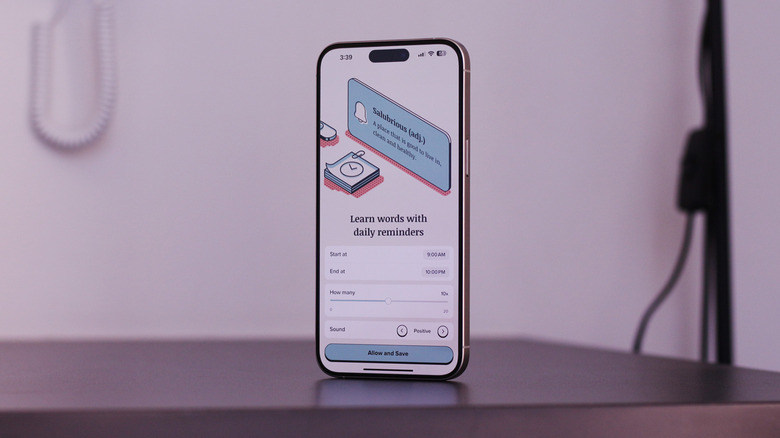
Adnan Ahmed/SlashGear
Moneky Taps has an impressive selection of apps dedicated to self-care, and Vocabulary is a stellar example of its design philosophy. The app has a very minimal user interface, with big, bold icons to perform important actions.
On the first launch, you will be prompted to follow along with a simple test wherein you need to match five words with their meanings. Based on the results, the app will display suggestions tailored to your current proficiency in English.
New words are displayed every time you open the app, with the option to hear it aloud, favorite it, or bookmark it. You can swipe up to reveal the next word or tap the «All» button to explore words from other languages and categories. The app lets you choose between a great number of voice options, though all of them sounded a bit too robotic for our liking.
Vocabulary also has a widget you can add on your phone’s home screen, so you essentially don’t need to launch the app ever. On a compatible iOS version, you can customize your iPhone’s lock screen and add a widget to learn new words without unlocking your device. Vocabulary has a premium subscription that unlocks all words and categories, gets rid of ads, and unlocks app themes. Fortunately, with the widget, avoiding advertisements in the free version is easy, and we found the default theme to be perfectly beautiful.
Duolingo
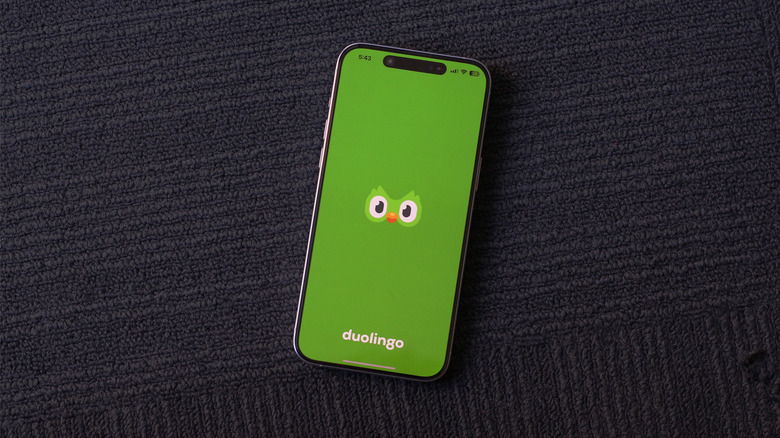
Adnan Ahmed/SlashGear
Duolingo is one of the best apps for learning new languages and improving vocabulary in a lexicon you’re already comfortable speaking. Its gamified approach to learning has made it a universally popular recommendation for all age groups.
Duolingo’s repetitive learning method distinguishes it from most other vocabulary apps, where you see a new word and understand its meaning, only to forget about it hours later. By encountering the same words a handful of times and in different contexts, you are sure to pick them up and add them to your vocabulary.
Another aspect where Duolingo shines the brightest is its support for over 45 languages. The mobile app lets you view words you’ve grown familiar with, so you can keep coming back to revise at a glance. Apart from using Duolingo as an app to strengthen your vocabulary, you can use it to get certified in English or learn Mathematics.
VocabularyBuilder
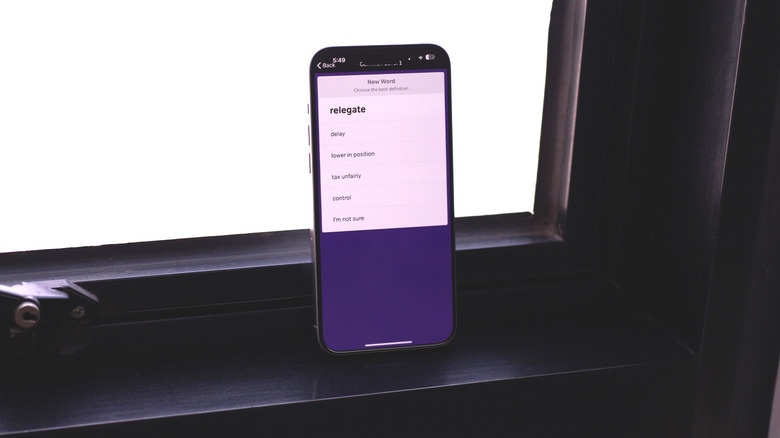
Adnan Ahmed/SlashGear
For those looking to crack language tests, VocabularyBuilder by Magoosh is a great place to start preparing. The app sources words commonly used in popular English language exams and allows users to learn them right on their smartphones.
You can study for general words asked in the GRE and GMAT, high school words for ACT and SAT, or English learner words used in TOEFL and IELTS. No matter which category you start with, you will find the word selection to be more sophisticated and pivotal for academic learning.
Instead of just displaying words with their meanings, VocabularyBuilder uses a quiz format to make learning more engaging. You will be asked the same selection of words a few times until you’ve mastered them. Every category has three difficulty levels, so you can get started with advanced vocabulary if you’re already confident with your English comprehension skills.
The app is quite barebones, both in terms of design and functionality. While we had no major complaints about its rather simple user interface, the «back» button and the app’s logo seem to be cut off on newer iPhones that have the Dynamic Island. As for other features, you can create an account with Magoosh to sync your progress between devices.
Elevate
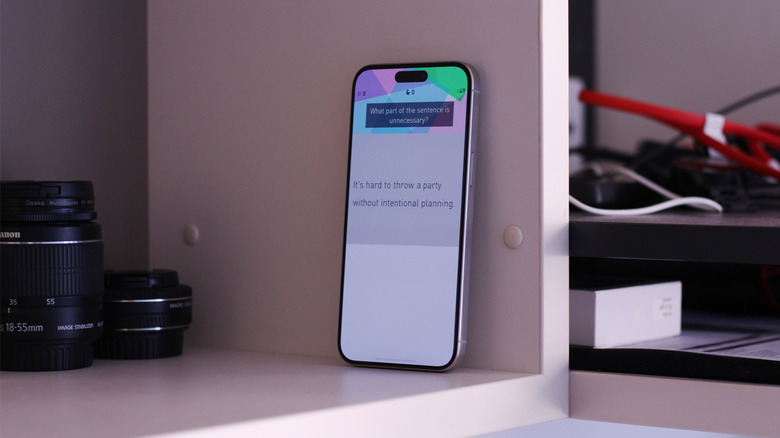
Adnan Ahmed/SlashGear
It can get quite boring being surrounded by words for long sessions, which is where Elevate comes in. The app won Apple’s App of the Year award, and for good reason — it truly challenges you to unlock an analytical mindset towards learning.
First-time users are required to go through a fun quiz that tests various aspects of their cognitive abilities of thinking, remembering, and analyzing. The app then calculates and displays an Elevate Proficiency Quotient, or EPQ for short. This score is based on a few factors like writing, reading, speaking, memory, and math skills and increases as you progress in these areas.
Elevate has a handful of vocabulary-oriented games that help you familiarize yourself with new words. The «Agility» game requires you to match synonyms, while the «Connotation» mode lets you separate words based on positive or negative implications. Other byte-sized games within the app constantly challenge your memory and vocabulary skills.
Unfortunately, the free version of the app is limited to just three games a day, a reduced library of words, and basic metrics to monitor your progress. However, despite a recurring fee model, Elevate is a fantastic app to subscribe to, given just how effective and fun its approach to learning is.
Wordscapes
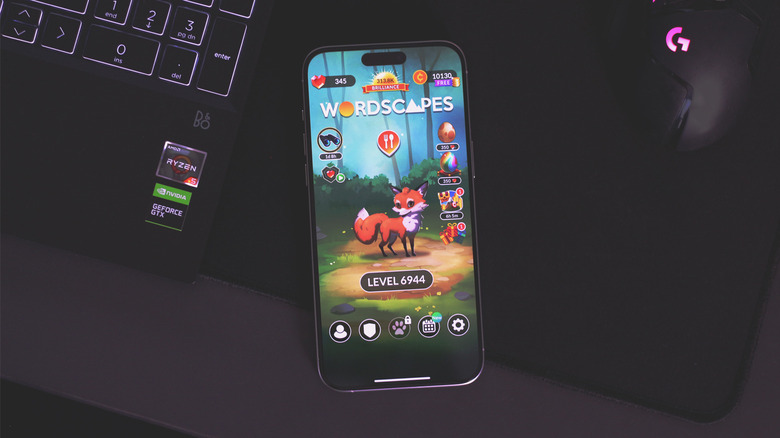
Adnan Ahmed/SlashGear
Our final mention on this list is quite literally a game. Wordscapes is available on iOS and Android and has over 50 million installs. Though it seems like a game tailored for young minds, you’d be surprised at just how addictive it could get (my mom is on level 6,943).
Having only five letters to craft an entire crossword puzzle is as interesting as it is maddeningly challenging. While it’s not the best way to jumpstart an already proficient vocabulary, as you reach higher levels in the game, you’ll start to see the difficulty crawling up.
Wordscapes works without an internet connection, as it downloads a few levels in advance when you’re connected. You can also continue solving your puzzles right where you left them off before. There is no limit to how many times you can try creating words, and even the ads aren’t too obtrusive, given that you’ll probably be stuck for minutes or even hours on every level.
Wordscape is one of the most fun alternatives to Wordle and a game that ultimately elevates your language skills. While the game does support in-app purchases for boosts and the removal of advertisements, you don’t need to spend a dime to level up your vocabulary using the free version.